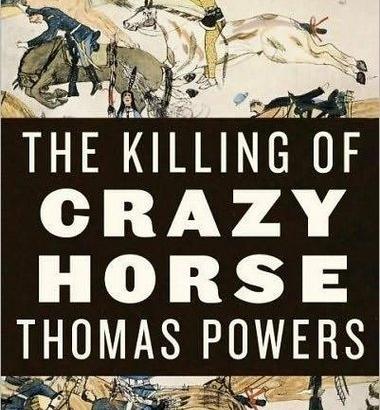Of the many pleasures to be found in Thomas Powers’s The Killing of Crazy Horse, the most basic for me was filling a lacuna in my knowledge of American history, situated vaguely between the Louisiana Purchase and the Oklahoma Land Rush. Little of my formal education dealt with Native American history, and of the Great Sioux Wars of the 1860s and 1870s, not much was taught beyond an obligatory mention of George Custer’s Last Stand. But Powers vividly brings the entire era to life, from the dusty frontier cavalry posts of the northern Plains to the gritty gold mining in the Black Hills, and he navigates effortlessly through a dizzying array of characters.
What we know about Crazy Horse’s youth comes almost exclusively from the late-in-life testimony of his closest friend He Dog, but Powers fleshes out the warrior chief’s last years with soldiers’ personal diaries and contemporary newspaper accounts. We know now that Crazy Horse was instrumental in many of the major Plains engagements with federal troops, from the Fetterman Massacre in 1866, in which he decoyed troops away from the protection of their fort, to the Battle of the Little Bighorn, where his pivotal gallop through the center of Custer’s forces sealed their doom. Yet by the following year, the chief had surrendered and signed on as an army scout.
Only a few months later, Crazy Horse was fatally stabbed in the back—most likely by an army trooper—during a confused melee as he was surrendering for questioning at Nebraska’s Camp Robinson in September 1877. Powers lays equal blame for his death on the bungling of the federal authorities, who chose to believe rumors he was plotting some new act of hostility, and the treachery of his fellow chiefs, many of whom were jealous of the deference being paid to him and anxious to have him out of the way. Like so much surrounding the interactions between the U.S. government and Indians during that time, the circumstances of the killing of Crazy Horse are filled not just with betrayal and mistrust on both sides, but with a sense of a tragedy that was somehow both avoidable and inevitable.
—James Carman
I’m slowly making my way through
Heavenly Questions, Gjertrud Schnackenberg’s latest collection of poems. Composed following the death of her husband, the philosopher Robert Novak, the poems are full of both grief and resilience. I particularly love the way that Schnackenberg looks to history and science to try to make sense of her husband’s illness and demise, even though anything approaching an adequate salve proves elusive. For more on the Washington-born poet, read this wonderful, erudite
interview of Schnackenberg.
—Megan Buskey
In anticipation of an upcoming trip to Israel, I recently tucked into David Grossman’s critically acclaimed
To the End of the Land; its story of Ora, a woman who desperately fears for the safety of her son in the Israeli army, has already tied my stomach in knots. In October, assistant editor Megan Buskey and I saw Grossman speak at DC’s Sixth & I Historic Synagogue. He transfixed the audience with his reflections on the writer’s work of exploring the darkest, most painful aspects of his characters. You can watch a video of the evening
here. I’m also hoping to get through Amos Oz’s memoir
A Tale of Love and Darkness and Elias Khoury’s
Gate of the Sun before I leave.
I recently finished three novels by the terrific Dara Horn, my favorite of which was the magical tale
The World to Come, a meditation on how we are shaped by the generations of our families before us. Horn studied Yiddish and Hebrew literature at Harvard and her novels are bursting with Jewish folklore and mysticism. I first read her work in
Commentary, where she published a darkly humorous short story, “
Shtetl World” (subscription required) about a living history museum where Eastern European shtetl life is reenacted for tourists (pogroms begin daily at 4:30!).
For something quick and fun, I recommend James Thurber’s memoir
My Life and Hard Times, a collection of short, silly stories about life in Columbus, Ohio, in the early 1900s. Thurber, who was a writer and cartoonist at
The New Yorker for much of his life, gives the members of his family so much color and verve that now, a century later, they seem to rise off the pages, as alive (and, surely, as nutty) as your very own.
—Rebecca J. Rosen
